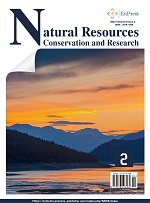|
|
Natural Resources Conservation and Research (NRCR, eISSN: 2578-1936), is a peer-reviewed, open-access journal that delivers high-quality original articles significant in all disciplines of conservation of resources and sustainable management. Contributions may have relevance at regional, national or international scales and may focus at any level of research from individual resources or technologies to whole sectors or systems of interest. Contributors may emphasize any of the aforementioned aspects as well as scientific and methodological issues. NRCR aims to provide a communication and information exchange platform for a broad audience of conservationist, environmentalist, ecologist, researchers and professionals. Articles from related fields that are interesting to a broad readership are particularly welcome.
Journal Abbreviation: Nat. Resour. Conserv. Res.
|
Online Submissions
Registration and login are required to submit items online and to check the status of current submissions.
Already have a Username/Password for Natural Resources Conservation and Research?
GO TO LOGIN
Need a Username/Password?
GO TO REGISTRATION
Submission Preparation Checklist
As part of the submission process, authors are required to check off their submission's compliance with all of the following items, and submissions may be returned to authors that do not adhere to these guidelines.
- The submission has not been previously published, nor is it under the consideration of another journal (or an explanation has been provided in Comments to the Editor).
- The submission file is in Microsoft Word format.
- Where available, URLs for the references have been provided.
- The text adheres to the stylistic and bibliographic requirements outlined in the Author Guidelines, which is found in About the Journal.
- If submitting to a peer-reviewed section of the journal, the instructions in Ensuring a Blind Review have been followed.
Article Processing Charges (APCs)
Natural Resources Conservation and Research is an Open Access journal under EnPress Publisher. All articles published in Natural Resources Conservation and Research are accessible electronically from the journal website without commencing any kind of payment. In order to ensure contents are freely available and maintain publishing quality, Article Process Charges (APCs) are applicable to all authors who wish to submit their articles to the journal to cover the cost incurred in processing the manuscripts. Such cost will cover the peer-review, copyediting, typesetting, publishing, content depositing and archiving processes. Those charges are applicable only to authors who have their manuscript successfully accepted after peer-review.
| Journal Title | APCs |
|---|---|
| Natural Resources Conservation and Research | $500 |
Waiver Policy
EnPress Publisher is committed to promoting academic development in the world without any financial barrier to knowledge sharing and learning. A waiver policy has been developed especially for authors from low-income countries. Authors who are interested in applying for a waiver or discount may contact the editorial office of the journal. EnPress Publisher reserves the right to approve or reject any waiver application. APC waivers do not influence editorial decisions.
Vol 8, No 1 (2025)
Table of Contents
Carbon credit-based policies are important to driving sustainable practices worldwide. These policies have in the past focused mainly on wetlands, forests, and other ecosystems, neglecting agroforestry—which is a climate-smart and agroecological practice. This paper therefore seeks to examine how carbon credit-based policies can drive sustainable agroforestry through an in-depth empirical review of literature. It was found that the most common carbon credit-based policies and schemes are government-led, including the CCER (China Certified Emissions Reduction), ETS (EU Emissions Trading System), and the California Global Warming Solutions Act in the United States of America. These schemes focus on heavy emitters such as transportation, steel, and cement. Carbon credits guiding carbon credit-based policy formulation and implementation are mainly: Credits from avoided emissions (not cutting down trees); credits from reduced emissions (energy-efficient technologies); and credits from removed emissions (tree planting and carbon capture tech). Factoring in these 03 main types of carbon credits into the carbon credit policy framework will drive sustainable agroforestry across the world in general and the developing world in particular, as smallholder agroforestry farmers will be encouraged to practice agroforestry. One of the main stumbling blocks to the practice of agroforestry is the financial cost involved in its establishment and management, which the carbon credit scheme would offset. Besides driving sustainable agroforestry, carbon credit-based policies in the domain of agroforestry would provide other co-benefits such as employment generation; technology transfer; improved energy security and access to energy services; improved livelihoods; improved air, water, or soil quality; and infrastructure development.
Between 2016 and 2017, four oceanographic cruises were carried out in the Perdido Fold Belt area, in the northeastern province of the Gulf of Mexico. Benthic fauna was collected by bottom trawling with a benthic sled at 27 sampling sites, ranging from shallow to abyssal depths. The results obtained with the group of crustaceans are presented, selecting only the trawls representative of the bathyal benthic provinces (200–2000 m) and the abyssal plains (2000–6000 m) for analysis. Thus, 31 trawls with depths of 470 to 3600 m were recorded. The group was represented by 35 families, 72 genera, and 95 species. The lowest abundance/biomass recorded at the sampling sites was 2 org·ha−1/17.67 g·ha−1, while the highest was 400 org·ha−1/5042.62 g·ha−1. The highest species richness (16 species) was found at depths of 470 m, and the lowest (1 species) at 950–1000 m. Consequently, the lowest diversity (0.0 bits·ind−1) was recorded at 950–1000 m and the highest (2.943 bits·ind−1) at 470 m. The dominance of the top 5 species on each cruise reaches more than 50% for each, with 3 species remaining in this classification across all 4 cruises. The similarity given by the Bray-Curtis index associates similar depths. The NMDS (Non-metric Multidimensional Scaling) was used for the species ordinations because it is suitable for non-normal data or data that is discontinuous in scale, and shows most of the species close to the origin of the axes, only the most abundant species or those with the greatest weight are separated at the first crossing, in the rest there is no defined pattern. The sea bottom, as it presents physical conditions of great stability, presents a reduced biodiversity where biotic variables, such as competitive exclusion, resource division, and predation, are essential factors that define the structure and functioning of the communities of mega crustaceans in this area.
The illegal wildlife trade significantly threatens global biodiversity, driving many species toward extinction and disrupting ecosystems. This transnational crime is fueled by high demand for wildlife products such as ivory, rhino horns, and pangolin scales and is exacerbated by weak enforcement and global trade networks. Conservation efforts aim to mitigate this crisis through habitat protection, anti-poaching initiatives, and public awareness campaigns. In recent years, wildlife forensic science has become an important tool in addressing wildlife crimes. By leveraging techniques such as DNA analysis, radiocarbon dating, and histopathology, forensic science aids in species identification, origin tracing, and criminal prosecution. This paper explores the intersection of illegal wildlife trade, conservation strategies, and forensic science, highlighting their synergistic potential to curb wildlife trafficking. Case studies illustrate how forensic evidence has been instrumental in dismantling smuggling operations and informing conservation policies. The paper also addresses challenges such as resource limitations and the need for international collaboration. Strengthening the integration of conservation efforts and forensic science is imperative to protect endangered species and promote biodiversity conservation.
The Natura 2000 network is the main tool established by the European Union for biodiversity conservation. The cornerstones of this natural infrastructure are, actually, represented by the Special Areas of Conservation (SAC) and the Zones of Special Protection (ZPS). In the Calabria coastal region, this network is formed by 44 ZSCs widespread along the regional coastline. In this way, most of the Natura 2000 sites are located in continental areas, as 75% of the whole, and every key area includes some natural habitat types. In particular, the greater number of habitats is concentrated in transitional environments, as the case study located in the mouth of the Crati River, including 17 habitat types. However, the geographic distribution of Natura 2000 sites is quite unbalanced because most of the SACs are located in continental landscapes, 75% of the whole, while only 25% are concentrated in coastal regions. This irregular distribution of the network leads to a loss of biodiversity levels from continental to coastal areas. So, the implementation of the Natura 2000 network could be the main tool to connect terrestrial and coastal regions not only for biodiversity conservation but also to improve the social and economic conditions of local people.
Announcements
Outstanding Author Awards | Celebrating Excellence in Research – Natural Resources Conservation and Research |
|
The editorial team of Natural Resources Conservation and Research is delighted to announce the recipients of this year’s Outstanding Author Awards. These awards recognize the exceptional contributions of researchers whose work has significantly advanced the field of natural resources conservation and sustainable development. |
|
| Posted: 2025-02-04 | More... |
Announcing the Release of Volume 7, Issue 1, 2024 Online! |
|
We are thrilled to announce that the latest edition of our publication, Volume 7, Issue 1, for the year 2024, is now available online! This issue is packed with insightful articles that we believe will be of great interest to our readers. To access this exciting content, simply visit our website and navigate to Vol 7, No 1 (2024). We encourage you to explore the diverse range of topics covered in this issue and share your thoughts with us. Thank you for your continued support. We look forward to your feedback and engagement with this new issue. |
|
| Posted: 2024-07-07 | More... |
World Environment Day! |
|
 |
|
| Posted: 2024-06-05 | |
| More Announcements... |



 eISSN: 2578-1936
eISSN: 2578-1936 Open Access
Open Access
